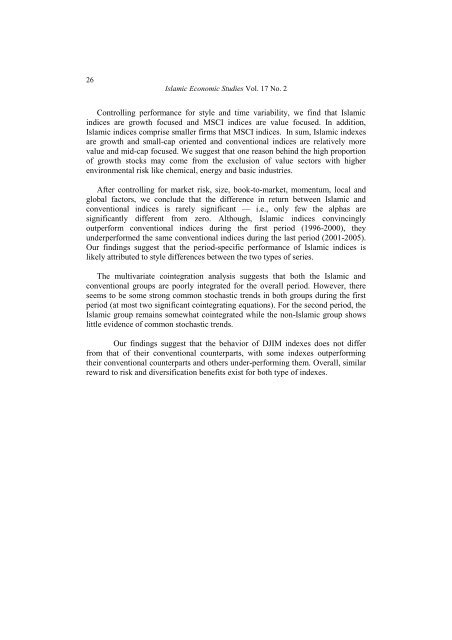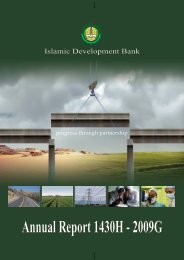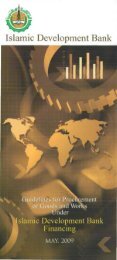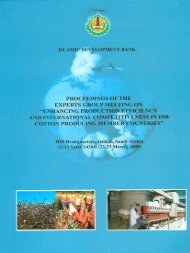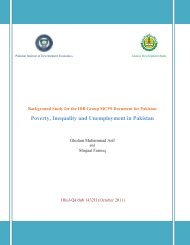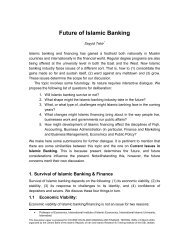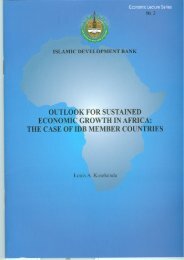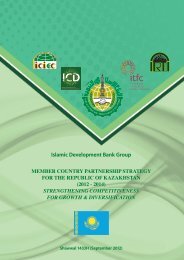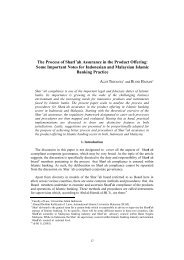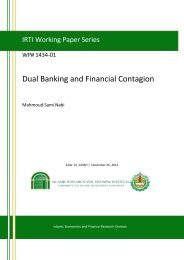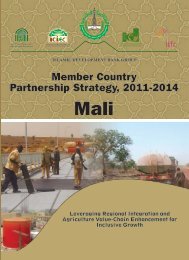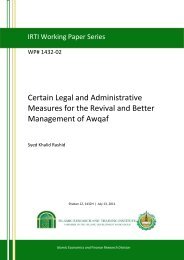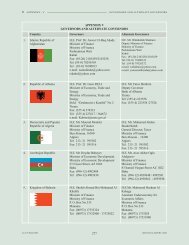faith-based ethical investing: the case of dow jones islamic ... - IRTI
faith-based ethical investing: the case of dow jones islamic ... - IRTI
faith-based ethical investing: the case of dow jones islamic ... - IRTI
- No tags were found...
You also want an ePaper? Increase the reach of your titles
YUMPU automatically turns print PDFs into web optimized ePapers that Google loves.
26Islamic Economic Studies Vol. 17 No. 2Controlling performance for style and time variability, we find that Islamicindices are growth focused and MSCI indices are value focused. In addition,Islamic indices comprise smaller firms that MSCI indices. In sum, Islamic indexesare growth and small-cap oriented and conventional indices are relatively morevalue and mid-cap focused. We suggest that one reason behind <strong>the</strong> high proportion<strong>of</strong> growth stocks may come from <strong>the</strong> exclusion <strong>of</strong> value sectors with higherenvironmental risk like chemical, energy and basic industries.After controlling for market risk, size, book-to-market, momentum, local andglobal factors, we conclude that <strong>the</strong> difference in return between Islamic andconventional indices is rarely significant — i.e., only few <strong>the</strong> alphas aresignificantly different from zero. Although, Islamic indices convincinglyoutperform conventional indices during <strong>the</strong> first period (1996-2000), <strong>the</strong>yunderperformed <strong>the</strong> same conventional indices during <strong>the</strong> last period (2001-2005).Our findings suggest that <strong>the</strong> period-specific performance <strong>of</strong> Islamic indices islikely attributed to style differences between <strong>the</strong> two types <strong>of</strong> series.The multivariate cointegration analysis suggests that both <strong>the</strong> Islamic andconventional groups are poorly integrated for <strong>the</strong> overall period. However, <strong>the</strong>reseems to be some strong common stochastic trends in both groups during <strong>the</strong> firstperiod (at most two significant cointegrating equations). For <strong>the</strong> second period, <strong>the</strong>Islamic group remains somewhat cointegrated while <strong>the</strong> non-Islamic group showslittle evidence <strong>of</strong> common stochastic trends.Our findings suggest that <strong>the</strong> behavior <strong>of</strong> DJIM indexes does not differfrom that <strong>of</strong> <strong>the</strong>ir conventional counterparts, with some indexes outperforming<strong>the</strong>ir conventional counterparts and o<strong>the</strong>rs under-performing <strong>the</strong>m. Overall, similarreward to risk and diversification benefits exist for both type <strong>of</strong> indexes.


